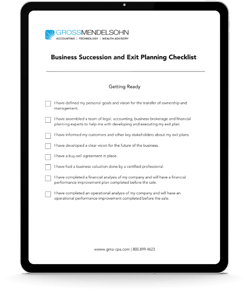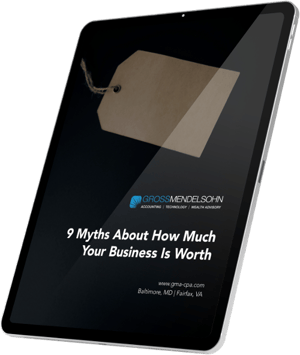How To Sell Your Business
At some point in time, every business owner faces a decision about selling their business.
It might be because the timing is right, or you’ve been approached to sell, or because it’s time to retire and you want to cash in on the years of hard work you’ve put into growing your business. That’s especially true today as baby boomers are exiting their businesses in record numbers.
But selling a business is not an easy undertaking as it involves significant preparation, a solid team of advisors and perseverance.
This guide presents 14 lessons (that we’ve learned as CPAs, business advisors and business valuation experts) that can help you sell your business easier and faster. You’re embarking upon a journey that is fraught with opportunities for mishaps, mistakes and disappointments. It’s a journey that requires a healthy dose of realism, tempered by a lot of hard work and preparation.
It’s our hope that this guide will help you navigate through tricky waters and put you in a better position to sell your business if that is your desire.
Read The Full Guide Below
![]()
Don't Have Time To Read The Complete Guide Now?
1. BE ENTIRELY SURE
Our first lesson is simple: indecision about whether or not to sell will only cost you time, money and frustrate you and potential buyers.
The decision to sell a business you have built and put your heart and soul into isn’t an easy one since most owners feel very attached to their company. We understand that your company is a major achievement and a reflection of your accomplishments. This makes the decision to sell a very difficult step to take.
Of course if you are the sole owner, the decision is yours alone and you get to decide when the time is right, but everyone will have to let go at some point.
We cannot tell you when the right time for you to sell your business is, but we have found that business owners who waffle about selling their business or who haven’t made a final determination to sell make the entire selling process more arduous and complicated.
It might be appropriate to consider engaging a life or transition coach to help you through the difficult pre-sale decisions you’ll need to make, and the equally difficult decisions about what you want to do with your life after the sale.
2. STEP BACK FROM THE DAY-TO-DAY
If you truly want to exit your business and sell it for a premium price, then you need to make sure that you’ve set up the business to run effectively and profitably without you. If your business has been built completely around you, then it’s going to be tough to convince a prospective buyer that the business has value above and beyond your role in its sales, management and operation.
Essentially, the best buyers are looking to purchase your business, not your job. If you are the main solution provider or salesperson in the business, there may be little value beyond your salary. And even if the company has significant value, if that value will go out the door with you instead of staying for the new owner, who is going to pay for it?
"Don't become synonymous with your company. If buyers aren't convinced that your business can run without you in charge, they won't make their best offer."
- JOHN WARRILLOW, BUILT TO SELL
Before putting the business up for sale, you’ll want to put as many necessary systems and processes in place to allow the business to operate smoothly without you. Train others to do things you really don’t need to be doing and institutionalize your marketing and sales systems as much as possible.
Although it can be uncomfortable, take yourself out of the day-to-day as much as possible. Of course you need to have your hands on the pulse of the company, but the more you can remove yourself from front-line selling and operations, the more attractive your company will be for a purchaser.
3. SELL ON THE UPSIDE
There can be a substantial variation in the price you get for your business depending upon your business or profit cycle, and you really don’t want to sell just when you feel like it – you need to sell when the timing is right.
Businesses and economies tend to be cyclical and there can be substantial variations in the price you can get for your business depending upon where it is in that cycle in terms of growth and profitability.
While we would not suggest trying to time your sale as some people attempt to time the stock market, you can increase your selling price by selling when things are good and you are not under outside pressure. The lesson: if possible sell in a period of growth in order to get the maximum sales price for your business. It’s more likely that buyers will pay a premium when earnings and revenue are trending up.
If you are developing a sales strategy, work with your CPA or business advisor to help pinpoint the upticks and trends in your business cycle, and then plan to bring your business to the market when it is trending up.
Business Exit Planning Checklist

4. USE FINANCIAL RECORDS
Together with your CPA or business advisor, it’s your responsibility to provide financial statements to potential buyers that accurately reflect your company’s operating results and financial position. Although you want to position your company in the best possible light, misrepresenting your business’s financial position could kill the sale, or even be the basis for legal action after the sale.
That being said, there are ways to cast your numbers in the most positive light possible. Here are just a few ways this can be accomplished:
-
Identify and include all appropriate add backs to EBITDA, like valuing inventory at FIFO instead of LIFO. Inventory that has become damaged or obsolete should be adjusted out.
-
Don’t overlook items that could have a positive impact on pro forma EBITDA and your valuation, like how new and recurring business will affect future revenue and earnings.
-
Recast historical financials that show how your business would have looked without your “excess” salary and perks, non-operating or non-recurring income/expenses, etc.
-
Consider ways to increase current EBIT by generating additional revenue and/or reducing unnecessary expenses.
-
Work with your accountant to see if there are opportunities – particularly in light of the new tangible asset regulations – to capitalize and deduct over time certain items that might otherwise be expensed and deducted in a single year.
-
Review your accounts receivable aging report and remove uncollectible accounts, taking them as a bad debt expense.
-
Since cash and cash equivalents are typically retained by the seller, consider reducing their balances to the amounts actually required for running the business.
-
Clean up any amounts due to/from shareholders from the balance sheet.
A word of caution here: work closely with your accountant to help you do any recasting of financial data to make sure that results are in line with generally accepted accounting principles.
Pay Less In Taxes When Transferring Your Family-Owned Business To The Next Generation

5. IMPLEMENT A MARKETING PLAN
Your business will sell faster and easier if you have an effective institutionalized marketing plan.
Essentially, buyers are making a purchase decision based upon their analysis and perception of the future earnings potential of your company. Since you are in the best position to do income and expense projections, you should be documenting future opportunities for the buyer.
The essentials of a marketing plan for your business include the following.
Specification Of Goals And Objectives
This should be a presentation of where you see the business in 1-, 3- and 5-year periods, with hard numbers representing your projections of growth and profitability should all of the plan’s strategies and tactics be realized.
Your Unique Selling Proposition
To make your business more marketable, it’s important to show potential buyers how your product or service is different, and how it stands above the rest.
Situation Analysis
Normally your buyers will want to see a market analysis, a SWOT analysis (strengths, weaknesses, opportunities and threats) and a competitive analysis. Your market analysis should show the potential buyer a market forecast, segmentation, customer information and market needs analysis.
Marketing Strategy
Buyers will want to see your mission statement, objectives and a focused strategy including the market segments the business addresses, how you position your product or service and a brand statement. They’ll also want to see your plans for product, distribution, pricing and promotions, along with plans for retaining customers, gaining repeat business and building loyalty.
Sales Plan And Forecast
Since buyers are buying a projection of the future, they’ll want to see enough detail to track sales month by month and follow up on plan vs. actual analysis. Normally a plan will also include specific sales by product, by region or market segment, by channels, by manager responsibilities and other elements. The forecast alone is a bare minimum.
Expense Budget
This ought to include enough detail to give prospective buyers the ability to see expenses month by month and on a plan vs. actual analysis. Normally a plan will also include specific sales tactics, programs, management responsibilities, promotion, and other elements. The expense budget is a bare minimum.
6. USE A CREDENTIALED PROFESSIONAL
Business owners tend to start the process of selling their business with unrealistic expectations about what their business is really worth. They tend to attach an emotional value to the price tag, or base it on benchmarks that don’t really apply to their situation.
The result is a tougher, longer, more time consuming path to selling the business. An unrealistic value can even frustrate or eliminate potential buyers.
That’s why it’s critically important for a seller to get an independent, objective evaluation of business worth by an accredited professional.
| Credential | Authority |
| Certified Public Accountant Accredited in Business Valuation (CPA/ABV) |
American Institute of Certified Public Accountants (AICPA) |
| Certified Valuation Analyst (CVA) |
National Association of Certified Valuation Analysts (NACVA) |
| Certified Business Appraiser (CBA) |
Institute of Business Appraisers (IBA) |
| Accredited Senior Appraiser (ASA) |
American Society of Appraisers (ASA) |
| Chartered Business Valuator (CBV) |
Canadian Institute of Chartered Business Valuators (CICBV) |
It is best to get the valuation early in the process since even the actual decision to try and sell the business will be largely dependent on the anticipated sales price. Here are a few criteria to consider when selecting a business valuation professional:
-
Look for a professional designation
-
Understand the deliverables and fees
-
Check their relevant experience and references
-
Look for someone who is willing to educate you on the valuation process, the assumptions utilized, and the effects changes in the assumptions would have on the final value
-
Evaluate how well they collaborate with other advisors, like attorneys and bankers
-
Consider their access to databases and other pertinent information about your industry
-
Determine whether or not they use multiple valuation approaches to arrive at their findings
-
Ask if they provide a customized report that addresses the specifics of your company’s history, operations, financial performance, and intangible risk factors and value drivers
7. DON'T DEMAND ALL CASH
As a seller, of course you would prefer an all cash transaction from the buyer; but buyers typically want to part with as little cash as possible to make the deal.
And, it’s highly likely that the buyer will be looking for some financing terms from you – which makes sellers leery that the buyer is going to pay for the business solely out of future profits. This is not unreasonable since most people who invest in or purchase a business expect to make back their investment plus a profit over a relatively short period of time.
The true opportunity to sell your business faster and easier – and smarter – lies in striking a deal somewhere between an all cash or an all financing scenario. In fact, more than 75% of the sellers who actually sell their businesses nationwide finance part of the purchase. Most sellers who are serious about selling eventually agree to finance, but sometimes only after months of lost time and frustration.
Before Transferring Your Family Business To The Kids, Consider These Things

8. BE SELECTIVE ABOUT THE BUYER
An unqualified prospect represents nothing more than wasted time, energy and resources, not to mention dashed hopes and frustrations. You need to make sure that buyers not only have the right motivation for buying your business but also, that they have the financial wherewithal to make the purchase. A buyer refusing to produce financial statements or information needed to run a D&B or credit report should raise huge red flags.
Having the right chemistry between buyer and seller can also be a critical factor in finding the right buyer for your business. You’ll want to evaluate the character and ability of the buyer to run the business, especially if you are going to be financing part of the deal.
When it comes to being selective, our recommendations for sellers include:
-
Use confidentiality agreements and get financial background information to pre-qualify potential buyers before you get too deep into the deal or before you share confidential financial information
-
Don’t get locked into dealing with just one potential buyer early – play the field and work on several potential deals all at the same time
-
Advertise that your business is for sale in the right markets and to the right audience, as this will cut down on the number of unworthy prospects for your business and increase the chance of selling to the right person at the right time
-
Be careful about offering the business to competitors as it puts you at risk of losing your protection for confidential or proprietary company information
9. NEGOTIATE A WIN-WIN SCENARIO
Even though you think that you may have found a perfect, qualified buyer, it’s still possible for your deal to fail at the negotiation stage. We have seen many situations where negotiating inflexibility – either on the part of the seller or the buyer – kills a deal.
The lesson: a “give a little, take a little” approach to negotiating for selling your business will go a long way toward reaching a successful conclusion. In negotiating circles, this is known as the win-win approach to negotiation where negotiators aim to work together towards finding solution to their differences that result in both sides being satisfied. Key points when aiming for a win-win outcome include:
-
Focus on maintaining the relationship – ”separate the people from the problem”
-
Focus on interests, not positions
-
Generate a variety of options that offer gains to both parties before deciding what to do
-
Aim for the result to be based on an objective standard
10. HAVE A TEAM OF TRUSTED ADVISORS
Selling a business is a tricky and complicated proposition.
We can say with authority that sellers who try to do it without the assistance of a team of professional advisors find the process to be longer and significantly more difficult than those who engage professional resources. Just think about the myriad of issues and tasks that need to be accomplished, from finding and qualifying buyers to doing a business valuation to writing the purchase agreement, and so on … the list of “to do’s” is simply staggering. And while all of the deal making is going on, you still have to run the business!
That’s why you need a team of professional advisors to make the sale of your business faster and easier. You need to engage experienced legal, accounting, investment banking, and consulting advice at the beginning and throughout the sales process.
Who Could Be On Your Team, And What Role Could They Play?
Chief Advisor / Quarterback
With all of the moving pieces and players involved in selling a business, it may be prudent to select one advisor from your team to serve in an overall quarterback role. Their job is to develop the master plan and coordinate the activities of the entire team to make sure a deal is done in a timely and efficient manner, with a focus on achieving the results you desire.
Attorney
The attorney’s role permeates the entire sales process. He/she is often intimately involved in establishing the structure of the transaction, factoring in the risk consequences for the client, negotiating many of the tax and financial terms based on input received from the accountant, broker and banker, and coordinating the timing and sequence of events to effectuate a successful close of the transaction.
Business Broker
Brokers and investment bankers often play some similar roles, such as exposing the business, generating interest in it, and bringing buyers and sellers together. Sometimes, depending on the nature of the industry, the reputation and tenure of the business, and the scope of the proposed transaction, a broker’s services may or may not be necessary. Brokers typically are involved in smaller transactions, while investment bankers are involved in larger transactions.
A seasoned business broker can read the market, knows who’s buying what and who has resources, and can weed out the so-called “tire kickers” from serious buyers with sufficient financial resources who are well-suited to run a business like yours. They will also ensure that news of the sale remains confidential, that loyal customers, staff, vendors and suppliers find out only when you’re ready to let them know. An experienced business broker knows what paperwork to file, and when.
One of the key functions of a business broker is to act as a cushion between the buyer and the seller and negotiate the details of the deal at a time when emotions can, and do, run high.
Business Valuation Analyst
A valuation analyst is a professional who determines how much a business is worth. They read and dissect business financial documents, like the balance sheet and income statement, look at the physical property and intellectual property owned by the business, and question officers, directors, and management about the operation of the company to arrive at their conclusion. A Certified Valuation Analyst (CVA) will consider various valuation approaches and methods appropriate for your specific company to let you know what it might sell for.
CPA
When it comes to selling your business, the CPA’s responsibilities can be wide ranging. From providing guidance on the decision to sell and an initial estimate of value to helping prepare the company and its financial information to present to potential buyers, structuring a deal and assisting in negotiations. Your CPA will work closely with your attorney to ensure the legal documents address the plan and can also serve as the quarterback of your advisory team.
Investment Banker
The role of an investment banker usually increases with the size of the transaction. In many of the larger acquisitions or mergers, it is the investment banker who may have initially suggested and developed the proposed structure for the transaction. Generally, it is their responsibility to assist on both valuation and funding.
Life Transition / Planning Coach
Because selling a business is fraught with emotion for many business owners, using the services of a life or transition coach may be a prudent way to deal with the discomfort from the unknowns and uncertainties of transitioning from owner to civilian. This role can become crucial where an owner is really agonizing over selling. A life or transition coach helps the owner chart a course through these emotional shoals with the goal of making your post-ownership life happy and fulfilling.
Wealth Management / Financial Advisor
11. GET YOUR TAXES IN ORDER
Selling a business is a taxable event, potentially the largest single taxable event in you will face. The good news is there are many opportunities to mitigate the taxes you will pay. The bad news is the tax structure most beneficial to the seller is generally the least attractive to the buyer.
The fact that buyers and sellers are across purposes creates one area of negotiation where a CPA can be invaluable. Being able to find more creative ways of avoiding or deferring the tax bill as well as balancing the needs of both parties in order to create a win-win takes experience and a clear head.
The type of business also matters, whether it is a partnership, limited liability company, corporation or S corporation. And there are opportunities to change from a less favorable form to something more advantageous if you begin planning a few years in advance.
It’s also important to remember that after you sell your business, your tax situation is going to change: you will no longer receive a salary and have income taxes withheld. You will be living off of the proceeds and the investment income it produces, and you will need to begin filing quarterly estimated tax payments. Your accountant can advise you as to how your personal tax situation will change so you can factor that into the process as well.
4 Critical Tax Consequences To Consider When Selling Your Business

12. SET A TIMELINE
The process of selling your business will be much easier and smoother if you take the time to properly prepare for the sale. Issues like securing necessary financial documentation, ability to show sustained profitability, resolution of staffing issues and a host of other problems will affect your business’s marketability and make selling your business easier.
One way to prepare for selling your business is to reach out to your support systems – accountants, lawyers, suppliers – and ask them where they see your company’s vulnerabilities. Basically you want to do your own due diligence before an acquirer does, and address any gaping holes before you put your company on the market. Another idea to consider is to ask your most valued customers to give you feedback as to what they value most about your business and what they wish you would improve. Making those improvements can result in happy and committed clients that can be a valuable asset when negotiating with a potential buyer.
Getting Ready To Put Your Business Up For Sale?
-
Address and resolve tax issues
-
Assemble your team of advisors
-
Make sure your accounting records are in order, clean up your balance sheet and income statement
-
Add to the sustainability of earnings via customer diversification
-
Get financial statements audited
-
Identify/resolve problematic legal and operational issues
-
Prepare accurate monthly financial statements
-
Replace or upgrade IT systems
-
Strengthen management teams
13. TAKE A HANDS-ON APPROACH
Even after you’ve selected and engaged your team of advisors, your work and role in selling your business is far from done. You can’t take a hands-off approach or wait and see attitude – selling a business is hard work!
No one has more inside knowledge or more incentive to sell than you, so here are a few ideas for making sure that you are substantially engaged in the sales process:
-
Interact with prospects
-
Find creative ways to promote your business for sale, from networking to advertising
-
Get financial documentation in order
-
Take responsibility for developing and executing an operational improvement plan
-
Hold your advisory team to a schedule of milestones that you should create at the beginning of the sales process
-
Know when to step away from negotiations and when to let your advisors play the lead role
-
Take responsibility for developing and executing a plan to improve your employees’ management skills
9 Myths About How Much Your Business Is Worth

14. MAINTAIN CONFIDENTIALITY
There are issues of confidentiality at play when selling your business, all of which can impact the ability to sell your business and have lasting ramifications if no deal can be reached.
The first issue deals with the appropriate timing of announcing that the business is for sale. You don’t want to negatively impact your sales or the morale of your staff if the word gets out that your business is for sale before you’re ready to promote it in the proper fashion. Customers, competitors, creditors and employees become hesitant when a business is for sale, often triggering reactions that can weaken your business momentum and therefore its value.
The second issue deals with the confidentiality of your trade secrets or intellectual property. You’ll need your attorney to prepare a confidentiality or a non-disclose agreement for qualified buyers before you reveal any proprietary or trade secrets. Another consideration: prospective buyers can become hesitant about purchasing a business if they feel sensitive information has been divulged to others.
The third issue is one of buyer perception. If a buyer knows you’ve been trying to sell your business for some period of time, they may think there is something wrong with your company. They also may believe you are in a weak negotiating position. Once the buyer has this perception in their head (it may be spoken or unspoken) it becomes more difficult to sell for the best price. And, the last thing you want to happen is for one of your suppliers, customers or competitors to tell your prospect that you have been trying to sell the business for 6-12 months but have not been able to find a buyer.
About The Author
David Lanchak, CPA, CCIFP, CVA
David Lanchak is a partner at Gross Mendelsohn. As a business owner himself, David enjoys serving as a sounding board for clients with business, tax and accounting questions. He most often works with clients who are buying or selling a business, planning an estate, developing a succession plan, or in litigation.
This publication was developed with the understanding that the publisher and distributor are not rendering legal, accounting or other professional advice or opinions on specific facts or matters and recommend you consult an attorney, accountant, tax professional, financial advisor or other appropriate industry professional. Some material may be affected by subsequent changes in the laws or in the interpretation of such laws. Therefore, the services of a legal or tax advisor should be sought before implementing any ideas contained in this publication.
© 2019 Gross, Mendelsohn & Associates, P.A. | All Rights Reserved
